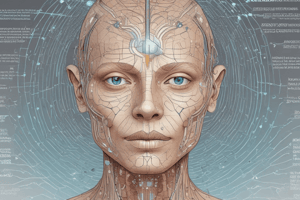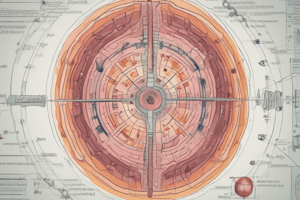Podcast
Questions and Answers
What characterizes evidence-based medicine compared to traditional practices?
What characterizes evidence-based medicine compared to traditional practices?
- Emphasis on clinical experience over published studies
- Reliance on expert opinion without data
- Prioritization of patient anecdotes over scientific evidence
- Use of systematic data and research findings in decision-making (correct)
Which of the following best describes the role of the electronic patient record?
Which of the following best describes the role of the electronic patient record?
- An archival system for legal purposes only
- An active partner that aids in clinical decision-making (correct)
- Merely a data entry tool without clinical relevance
- A passive document that stores patient history
What is the primary focus of implementation science in healthcare?
What is the primary focus of implementation science in healthcare?
- Understanding and improving the adoption of evidence-based practices (correct)
- Enhancing the quality of patient interactions
- Developing new medical technologies
- Training healthcare professionals in traditional methods
Which statement reflects the concept of precision medicine?
Which statement reflects the concept of precision medicine?
How is big data technology applied in healthcare?
How is big data technology applied in healthcare?
What does the hierarchy of evidence in clinical practice prioritize?
What does the hierarchy of evidence in clinical practice prioritize?
What is a key function of clinical decision support systems?
What is a key function of clinical decision support systems?
Which organization is recognized for establishing guidelines in evidence-based healthcare practice?
Which organization is recognized for establishing guidelines in evidence-based healthcare practice?
What is one of the initial stages in the development of evidence regarding medical practices?
What is one of the initial stages in the development of evidence regarding medical practices?
Which component is NOT included in the definition of big data?
Which component is NOT included in the definition of big data?
How do antibiotics potentially influence non-infectious diseases according to recent evidence?
How do antibiotics potentially influence non-infectious diseases according to recent evidence?
What is a clinical decision support system (CDSS) primarily designed to assist with?
What is a clinical decision support system (CDSS) primarily designed to assist with?
What does the interrogation of patient records facilitate in the context of big data?
What does the interrogation of patient records facilitate in the context of big data?
What are some implications of utilizing electronic patient records with AI and machine learning?
What are some implications of utilizing electronic patient records with AI and machine learning?
What aspect of the bowel microbiome is increasingly recognized in medical research?
What aspect of the bowel microbiome is increasingly recognized in medical research?
Which of the following best defines the 'hierarchy of evidence'?
Which of the following best defines the 'hierarchy of evidence'?
What potential effect do antibiotics have on health according to the research?
What potential effect do antibiotics have on health according to the research?
What is the primary role of NICE?
What is the primary role of NICE?
Which term is used to describe treatment tailored to the individual rather than groups?
Which term is used to describe treatment tailored to the individual rather than groups?
What is the significance of pharmacogenomics in medicine?
What is the significance of pharmacogenomics in medicine?
What has been established about the changing landscape of knowledge and evidence in healthcare?
What has been established about the changing landscape of knowledge and evidence in healthcare?
What was the original name of NICE when it was established in 1999?
What was the original name of NICE when it was established in 1999?
What is a potential future direction for medical treatment as suggested in the discussion?
What is a potential future direction for medical treatment as suggested in the discussion?
How has the scope of NICE expanded since its establishment?
How has the scope of NICE expanded since its establishment?
What is a significant challenge posed by evidence-based medicine according to Sackett and colleagues?
What is a significant challenge posed by evidence-based medicine according to Sackett and colleagues?
Which of the following best describes the purpose of a randomized controlled trial (RCT)?
Which of the following best describes the purpose of a randomized controlled trial (RCT)?
Which aphorism highlights the misconception regarding evidence in medicine?
Which aphorism highlights the misconception regarding evidence in medicine?
What does the process of synthesizing information into evidence involve?
What does the process of synthesizing information into evidence involve?
Which statement is a critique of the concept 'Doctor knows best' in the context of evidence-based medicine?
Which statement is a critique of the concept 'Doctor knows best' in the context of evidence-based medicine?
How does evidence-based medicine address established practices that may be outdated?
How does evidence-based medicine address established practices that may be outdated?
What role does random allocation of subjects play in RCTs?
What role does random allocation of subjects play in RCTs?
Which of the following accurately reflects a tenet of evidence-based medicine?
Which of the following accurately reflects a tenet of evidence-based medicine?
Flashcards are hidden until you start studying
Study Notes
Evidence-Based Practice
- Evidence-based medicine emphasizes the use of evidence for individualized patient care, challenging traditional notions of clinical freedom and established practices.
- Developed by Sackett and colleagues at McMaster University, it promotes rigorous decision-making supported by evidence rather than solely physician experience.
Hierarchy of Evidence
- The hierarchy categorizes evidence, progressing from anecdotal experiences to high-quality randomized controlled trials (RCTs).
- RCTs minimize bias by randomly assigning subjects to experimental and control groups, crucial for testing treatment effectiveness.
Electronic Patient Record (EPR)
- EPRs link prescriptions, diagnostic categories, and clinical decision support systems, enhancing patient care.
- Allows for the analysis of vast patient data sets, driving insights into health trends and disease associations.
Big Data in Health Informatics
- Big data encompasses large, complex datasets characterized by greater variety, volume, velocity, and veracity—often unmanageable by traditional software.
- Utilizes patient records for in-depth analysis, aiding in understanding relationships between treatments (e.g., antibiotics and non-infectious diseases).
Implementation Science
- Focuses on how to effectively integrate evidence-based practices into healthcare settings, addressing barriers to adoption.
National Institute for Health and Care Excellence (NICE)
- NICE provides national guidance for health promotion, illness prevention, and treatment, evolving from its origins as the National Institute for Clinical Excellence.
- Has expanded to include public health and social care guidance since becoming an independent body in 2013.
Precision Medicine
- Aims to tailor treatments to individual patients rather than populations, based on genetic and biomolecular insights.
- Involves pharmacogenomics to understand how genetics influence drug responses, aiming to identify effective treatments for unique patient profiles.
Context of Evidence
- Highlights the importance of synthesizing diverse evidence sources, including perspectives from patients, researchers, and clinicians.
- Signifies the fast-paced evolution of knowledge, particularly noted during crises like COVID-19.
Clinical Decision Support Systems (CDSS)
- These systems provide healthcare professionals with knowledge and patient-specific information to enhance decision-making in clinical practice.
Studying That Suits You
Use AI to generate personalized quizzes and flashcards to suit your learning preferences.




